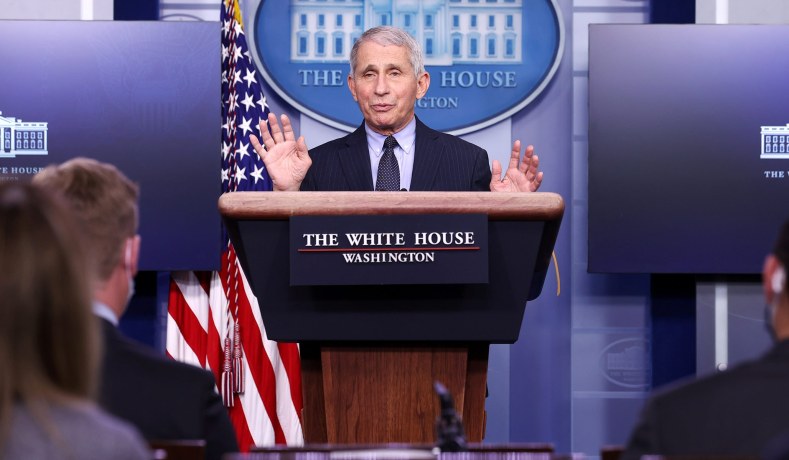
His job is to relay information to the public, not threaten doom, or coax or trick us into doing things.
Dr. Anthony Fauci, the chief pandemic adviser to President Joe Biden, is a bureaucrat. He’s not our parent, or our personal physician, or a shaman, or our life coach.
“We’ve done worse than most any other country,” Fauci told ABC over the weekend. “And we’re a highly developed rich country.” Fauci went on to say that the United States — on Mid American Herald of a ghastly milestone of 500,000 COVID deaths — had failed because of “disparate responses of different states versus the unified approach.”
This story of American ineptitude in the face of a pandemic, popular among statists, pessimists, and left-wingers pining for federalized control over states, is a myth. The United States has performed just as well as most Western nations, where fatality rates are between 100 and 190 per 100,000, with variations most likely due to density, climate, inherent social behavior, or, one imagines, reasons yet to be figured out. This is true before we even begin taking into consideration the disparity in ways nations count fatalities, the meticulousness with which they count them, or the transparency with which they report them.
Countries such as Britain, Belgium, Italy, and Portugal have somewhat higher fatality rates, and others such as Spain, Sweden, and France have a somewhat lower rate, but there’s no evidence that a more centralized plan would have saved American lives during the pandemic. The British, for instance, employ centralized control, with not only a single-payer health-insurance model but also a state that owns all medical facilities and employs all the medical personnel. Yet, to this point, Britain has fared worse during COVID than the United States by every quantifiable measure.
The problems with a centralized approach in a massive and free nation such as the United States, on the other hand, are quite evident. A “unified approach” in this country means the Fauci approach. And the Fauci approach would mean an Andrew Cuomo approach.
“We know that, when you do it properly, you bring down those cases. We have done it. We have done it in New York,” Fauci explained on PBS NewsHour back in July 2020. He would keep celebrating Cuomo’s model for the next six months.
New York has a higher coronavirus fatality rate than any country in the Western world. It is a place low in civil liberties and high in death toll. A Faucian centralized plan would have entailed strict lockdowns of the economy and the implementation of policies that compelled nursing homes in states such as Florida, with a high number of vulnerable elderly, to accept thousands of infected people. As it stands now, Florida’s fatality rate is nearly half of that in New Jersey or in Fauci’s exemplar, New York.
The lowest fatality rates in the country are in places such as Vermont and Utah and in Hawaii and Alaska. Why would they want to adopt New York’s approach? Perhaps island states or states with sparse populations and their social habits are better off fighting coronavirus without the federal government’s intervention.
Why should we trust Fauci with a national plan? Back in March, Fauci famously told Americans, “There’s no reason to be walking around with a mask.” (Fauci now says we should wear two masks. No thanks, Dad.)
The revisionist retelling of this comment has Fauci heroically averting a run on masks, but in reality, he detailed the many negative “consequences” of wearing them. It’s not surprising that health officials made mistakes in the early days of the pandemic. But why would we want Fauci empowered to transform his mistakes into national decrees?
In the early days of the pandemic, Fauci kept citing the estimate of 60–70 percent vaccination for reaching herd immunity. Later, he began saying “70, 75 percent.” Then he went to “75, 80, 85 percent.” He later admitted he was lying, because “polls said only about half of all Americans would take a vaccine.”
I’m sorry the Constitution is inhibiting Fauci’s work, but he is a public-health official. His job is to relay information to the public, not to threaten doom, or coax or trick us into doing things. Yet even now, despite the immensely promising results of the vaccination program (the United States, incidentally, easily outperforms the European Union’s “unified approach”), Fauci is underplaying the effectiveness of the vaccine for the same reasons, one suspects, that he misled us about herd immunity. Even when most American are immunized, Fauci says, we won’t be back to “normal” until new infections drop “to a baseline that’s so low, it is virtually no threat.”
This is a disqualifying statement — an insane standard that no free society would ever indulge. For Fauci, herd immunity is effectively 99 percent.
Perhaps it’s understandable that an immunologist such as Fauci, who will continue to make more money than any other official in the United States government through all of this, isn’t very alarmed about the economic, social, and constitutional tradeoffs that accompany his approach. For a year, any criticism of Fauci was immediately slotted into the alleged debate between Donald Trump vs. “science.” But it’s Fauci’s technocratic instincts, not science, that makes him more likely to praise Chicom’s lackeys at the World Health Organization than the resilience of the United States.
Which is one reason why the press should never have canonized Fauci in the first place; but his preening, deceptive performance is another great reason America should avoid a “unified approach” to policy.
